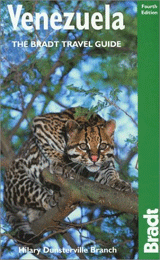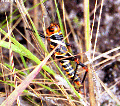Venezuela Pictures
During the summer of 1996 I went treking on and around Auyentepui in
Venezuela.  Recommended travel guides on Venezuela:
Recommended travel guides on Venezuela:
Venezuela -- from Wikipedia Venezuela is home to a wide variety of landscapes, such as the northeasternmost extensions of the Andes mountains in the northwest and along the northern Caribbean coast, of which the highest point is the Pico Bolívar at 5,007 m. Also found in the northwest are the lowlands around Lake Maracaibo and the Gulf of Venezuela. The centre of the country is characterised by extensive plains known as the llanos that stretch from the Colombian border to the river delta of the Orinoco east. To the south are found the dissected Guiana Highlands, home to Angel Falls, the world's highest waterfall. The local climate is tropical and generally hot and humid, though more moderate in the highlands. The capital, Caracas is also the country's largest city. Other major cities include Maracaibo, Barquisimeto, Valencia, Maracay, and Ciudad Guayana. (more) History Venezuela was the site of one of the first permanent Spanish settlements in South America in 1522, and most of the territory eventually became part of the viceroyalty of New Granada. Parts of what is now eastern Venezuela became New Andalusia. After several unsuccessful uprisings, the country declared independence from Spain in 1811 under the leadership of its most famous son, Simón Bolívar.The revolutionary war was decided, however, in the famous battle of Carabobo in June 24th 1821, led against Bolívar's orders by "Grand Marshall" (Gran Mariscal de Ayacucho) Antonio José de Sucre, when the revolutionaries beat the Spaniards. Simon Bolivar led the armies of Venezuela and other countries to free and found what are now Colombia, Panama, Ecuador, Peru, and Bolivia. Another important revolutionary leader during the war was the aforementioned Antonio José de Sucre, who won many battles for Bolivar and was a candidate to become his natural succesor until he was murdered. Venezuela became, after the revolutionary war, along with Colombia and Ecuador part of the Republic of Gran Colombia (República de Gran Colombia) until 1830, when the country separated and became a sovereign republic. Much of Venezuela's 19th and early 20th century history was characterized by political instability, political struggle, and dictatorial rule. Following the death of Juan Vicente Gómez in 1935 and the demise of caudillismo (authoritarian oligarchical rule), democratic struggles eventually forced the military to withdraw from direct involvement in national politics in 1958. Since that year, Venezuela has enjoyed an unbroken tradition of democratic civilian rule, though not without conflict. In 1992, there was an attempt by rebellious entities within the Venezuelan military, led by Lieutenant Hugo Chávez, to remove two-time democratically elected president Carlos Andrés Pérez from power. The coup ultimately failed, and Chávez and his co-conspirators were jailed for treason. Pérez, on the other hand, was eventually impeached and convicted for corruption. The coup brought about the death of 80 civilians and 17 members of the armed forces. Chávez's role in resisting a president generally perceived as corrupt by the lower classes made him a prominent figure among them. Chávez was eventually released from jail in 1994 by Perez's elected successor, Rafael Caldera. Chávez was elected president in 1998 with 56% of the vote as part of a new political party, the Movement for the Fifth Republic. His platform ("Bolivarian revolution") called for the signing of a new constitution, which was written by a Constituent Assembly and approved by referendum in 1999. Chávez was re-elected in 2000 under the new constitution with 59% of the vote. In November 2000, the National Assembly granted Chávez the right to rule by decree for one year, and in November 2001, Chávez made a set of 49 decrees, including large reforms in oil and agrarian policy. The Chávez presidency has for the first time given the majority of Venezuelans a share in the national wealth. Chavez controls all branches of the government since his party has a majority in the National Assembly, and he has hand picked the judges of the Supreme Tribunal. In December 2001, the nation's largest business organizations and the petroleum workers' union organized a general strike. In 2002, the US-backed opposition staged an unsuccessful coup and briefly installed Pedro Carmona Estanga as president of Venezuela. Due to a subsequent, popular uprising, with support from the rank and file members of the military, Pedro Carmona was forced to resign. Diosdado Cabello, Vice President of Venezuela, became president as dictated by the constitution. Chávez was restored to the Presidency in 48 hours. A recall referendum was held on August 15, 2004, which Chávez won with approximately 58% of the vote. Leaders and supporters of the opposition accused Chavez of rigging the election, but failed to prove the accusation. The opposition claims were later silenced when the Organization of American States and the Carter Center certified the referendum. In 2004 plans for another coup were allegedly foiled. Since then, Chávez's popularity in Venezuela and throughout Latin America, where two-thirds of the South American continent have elected pro-people presidencies, has grown. As oil prices have soared in the wake of the second Iraqi war and booming Chinese demand, oil-rich Venezuela has had the opportunity to refuse loans and aid from the US. The Bush Administration's influence in Caracas has plummeted, as president Hugo Chávez accuses the Bush administration of supporting the failed 2002 Venezuelan coup. Chávez's program has sought to decrease dependency on Washington and to diversify diplomatic and economic ties with governments throughout the world, such as Cuba, Brazil, Argentina, Uruguay, among many other Latin American countries, as well as China, Iran and India. His government has also consistently pursued closer ties to other countries opposed to global control by the US corporate state. Articles involving tourism in Venezuela: |













































